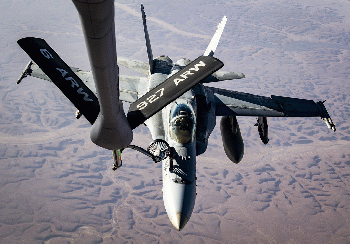
A U.S. Marine Corps F/A-18C Hornet refuels from a U.S. Air Force KC-135 Stratotanker over the U.S. Central Command area of responsibility.
(Image by Official U.S. Navy Imagery from flickr) Details DMCA
With none of the usual fanfare associated with such a momentous decision, the Pentagon announced last month a major reorganisation to bring Israel - for the first time - inside its military command in the Middle East alongside the Arab states.
Until now, Israel has belonged to the US military's European command, or Eucom, rather than the Middle Eastern one, known as Central Command, or Centcom. The decision effectively jettisoned the traditional wisdom that Israel's inclusion in Centcom would increase friction between the US and Arab states, and would make the latter more reluctant to share intelligence or cooperate with the Pentagon.
Those concerns were felt especially keenly when the US had large numbers of troops in Iraq and Afghanistan. Back in 2010, David Petraeus, then Centcom's commander, expressed fears that the price of too-overt military collusion with Israel could be exacted on US forces stationed in the region.
But Israel's long-standing goal has been to force the Pentagon to restructure Centcom, and pressure had mounted from pro-Israel lobby groups in Washington in the final months of the Trump administration. The decision looked very much like a "parting gift" to Israel from President Donald Trump as he stepped down.
Israel's formal transfer to Centcom has not yet taken place, but the move was cemented last week with the first visit to Israel by General Kenneth McKenzie, the current head of Centcom, since Joe Biden entered the White House. Alongside Israel's military chief of staff, Aviv Kohavi, McKenzie planted a tree - officially to mark the Jewish holiday of Tu Bishvat but symbolically representing a new era in their strategic partnership.
On Friday, after a meeting with the US general, Benny Gantz, Israel's defence minister, issued a statement praising the Pentagon's reorganisation, saying it would "afford Israel opportunity to deepen cooperation with new regional partners and broaden operative horizons".
The decision to bring Israel inside the US military command in the Middle East is best viewed - from Washington's perspective - as the culmination of efforts to push the Arab states into public "normalisation" with Israel.
Military normalisation can now be added to the political, diplomatic and economic normalisation that formally began last September when two Gulf states, the United Arab Emirates and Bahrain, signed the so-called Abraham Accords with Israel. Morocco and Sudan have also announced their own peace deals with Israel, and other Arab states are likely to follow suit once the dust settles with the incoming Biden administration.
Since the signing of the Abraham Accords, the UAE has been forging strong trading ties with Israel and has helped to establish the Abraham Fund, designed to finance the infrastructure of occupation Israel has used to deprive the Palestinians of statehood. When flights to Dubai were launched in November, Israeli tourists poured into the UAE to take advantage of the new friendly relations and escape lockdown restrictions back home.
In fact, it is widely reported that such visits have become one of the main ways Israel has imported new variants of Covid-19. Last week, Israel effectively closed its borders - except to General McKenzie - to keep the virus in check.
Growing confidenceOn the face of it, Israel's desire to move into Centcom - a kind of Middle East Nato covering several Arab states with which Israel still has hostile relations - appears counter-intuitive. But, in fact, Israel will make major strategic gains.
It will align US security interests in the region even more closely with Israel's, at the expense of its Arab neighbours. It will aid Israel's continuing efforts to crush the national ambitions of the Palestinians, with many Arab states' either explicit or implicit cooperation. It will accentuate political tensions within the bloc of Arab states, further weakening it. And it will help to build pressure on recalcitrant Arab states to join the broader consensus against Israel's one remaining significant regional foe: Iran.
It is significant that Washington's long-standing concern about Israel's presence in Centcom damaging US relations with the Arab states has apparently evaporated.
Once, the US was careful to distance itself from Israel whenever the Pentagon got deeply mired in the region, whether it was the US Gulf war of 1990 or the invasion and occupation of Iraq in 2003. Those calculations no longer seem relevant.
(Note: You can view every article as one long page if you sign up as an Advocate Member, or higher).





